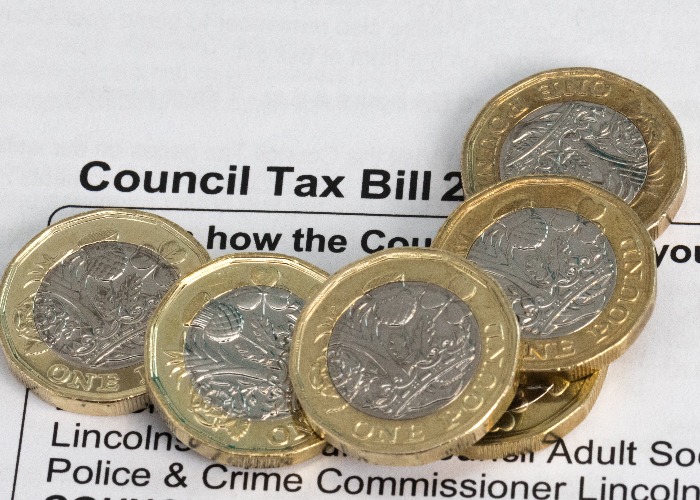Council Tax soars by up to 563%: worst hit areas revealed

Council Tax bills have soared over the past 25 years, but at the same time services have been cut. We look at the areas where households have been hardest hit, and those who have escaped relatively unscathed.
A bill levied on every home to help fund local services was introduced back in 1993.
Since then, the ever-unpopular Council Tax has soared, with some areas seeing a 563% increase in their bills over the past 25 years, an investigation by Money Mail has revealed.
In parts of the UK, the levy has risen nine times faster than inflation.
For example, in Wellingborough, Northamptonshire a band D property – the most common council tax bracket – paid £245.25 a year back in 1993.
Now, that same property faces a £1,625.82 annual Council Tax bill.
That’s a 563% rise over 25 years. In contrast, inflation – which measures the cost of living – has gone up by 'just' 65% over the same period.
More than 300 local authorities have hiked Council Tax faster than the cost of living, but others have risen at a far slower rate showing that the ultimate postcode lottery exists when it comes to Council Tax.
In North Dorset, Council Tax has risen by 315% since 1993, up from £463.50 a year for a band D home to £1,924.94.
Find out if you're due a Council Tax reduction
Biggest Rises
|
Council Area |
Annual rate in 1993 for a Band D property |
Annual rate Now |
Percentage change |
|
Wellingborough |
£245.25 |
£1,625.82 |
563% |
|
North Dorset |
£463.50 |
£1,924.94 |
315% |
|
Huntingdonshire |
£434.25 |
£1,753.39 |
304% |
|
Purbeck |
£484.88 |
£1956,69 |
303% |
|
Hambleton |
£424.13 |
£1,695.68 |
300% |
Lucky Londoners
Homeowners in London have seen the smallest Council Tax rises over the past 25 years, with residents in Wandsworth seeing their bills rising slow than inflation, meaning they're effectively paying less in real terms.
A band D property in the South London area paid £448.88 when Council Tax was introduced – far more than residents in Wellingborough at the time.
Since then, Wandsworth council has increased rates by just 61% taken that annual bill to £722.65, almost £1,000 less than the unfortunate people of Wellingborough.
Residents in several other London boroughs including Greenwich and Islington have also enjoyed relatively small rises in their tax bills.
Smallest Rises
|
Council Area |
Annual rate in 1993 for a Band D property |
Annual rate Now |
Percentage change |
|
Wandsworth |
£448.88 |
£722.65 |
61% |
|
Greenwich |
£783 |
£1,429.46 |
83% |
|
Hammersmith & Fulham |
£549 |
£1,022.04 |
86% |
|
Hackney |
£698.63 |
£1,374.67 |
97% |
|
Islington |
£679.50 |
£1,429.45 |
105% |
Generous salaries
One area of council spending that has soared as much as council tax over the past 25 years is the salaries of senior council workers. Over 2,000 earned more than £100,000 in 2017.
Mark Rogers, the former CEO of Birmingham City Council receives the highest pay in 2017.
His total package was £662,662 made up of a £168,985 salary, £118,000 compensation for loss of office when he resigned and pension contributions of almost £370,000.
Care costs are key
When Council Tax was introduced back in 1993 the aim was for it to cover the cost of local services. But, while bills have soared many of us have seen our council-provided services cut.
From disappearing bus routes to ever-larger potholes it seems we are paying a lot more for a lot less.
Read: how to claim for pothole damage
Councils defend the soaring cost by saying it's needed to help cover increasing elderly care costs and protect other services from further cuts.
“Since 2010, council tax bills have risen by less than inflation and other key household bills,” a Local Government Association (LGA) spokesman told the Daily Mail.
“But, faced with severe funding pressures, many councils feel they are being left with little choice other than to ask residents to pay more to help them try to protect their local services.”
The LGA said that the funding gap will exceed £5 billion by 2020.
What can you do about it?
The amount of Council Tax you need to pay isn't necessarily set in stone. You might, for example, find your home has been mistakenly placed in a higher tax band.
You can learn more about ensuring you aren't overpaying for Council Tax each month in this guide.
Comments
Be the first to comment
Do you want to comment on this article? You need to be signed in for this feature